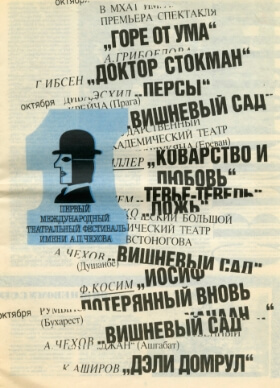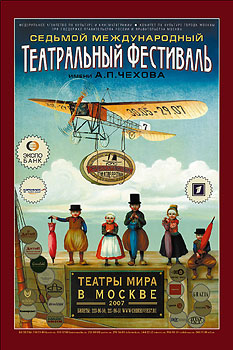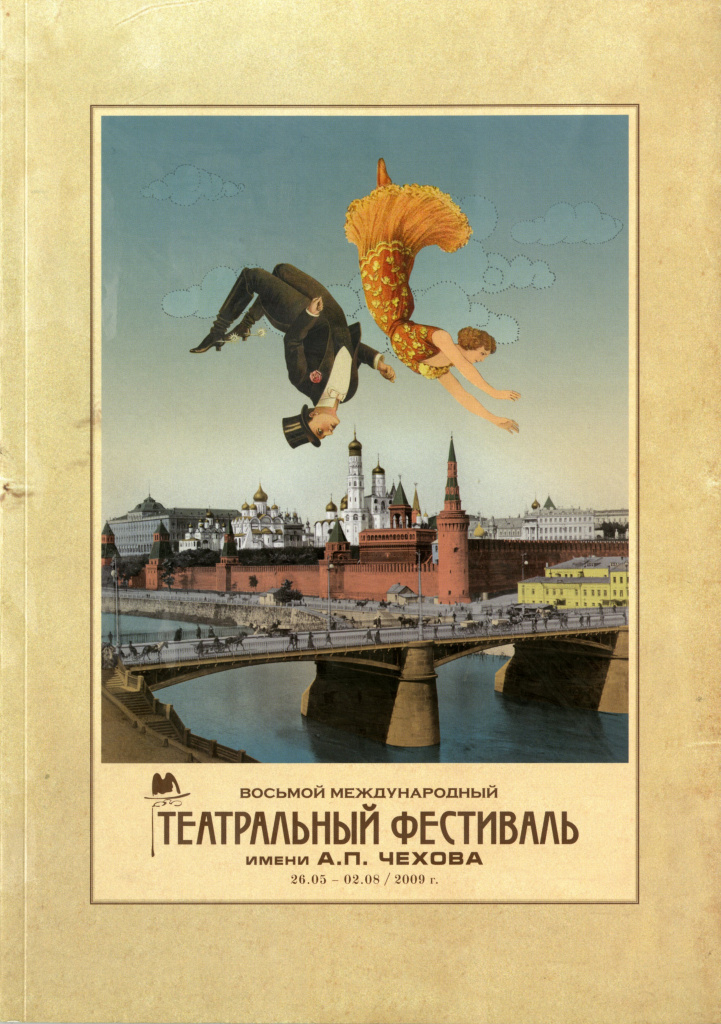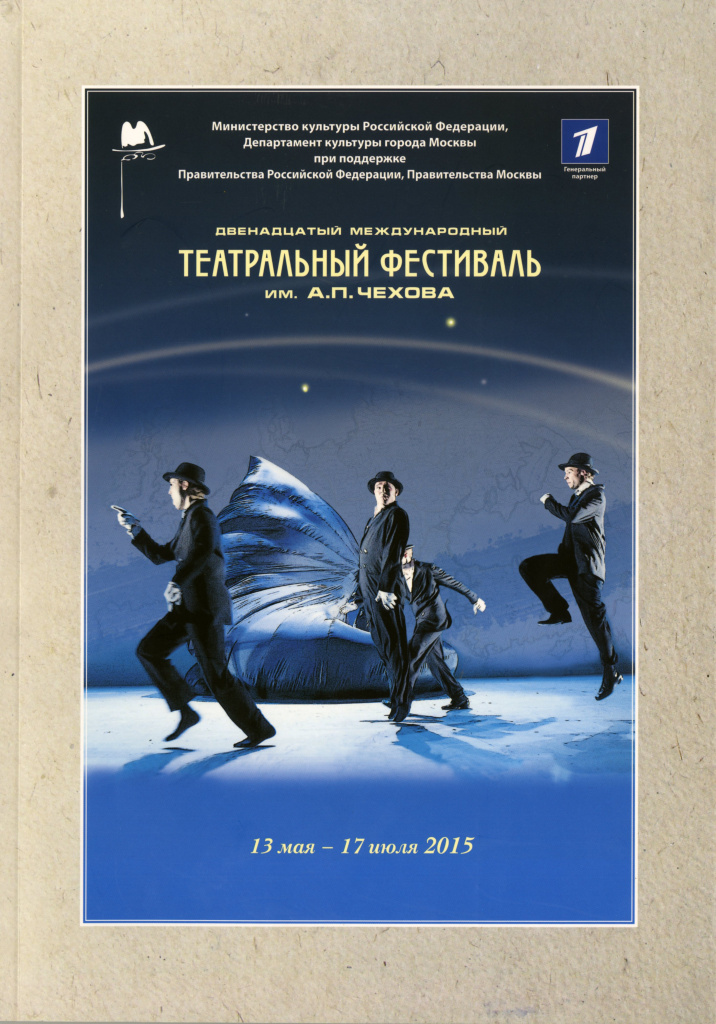About us
The Chekhov International Theatre Festival, first held in 1992, is the first and biggest international theatre event of this scale in Russia, and among the best-known theatre forums in the world. Its motto is the words of the great director Giorgio Strehler – “Theatre for All”. For thirty years the Chekhov Festival has been building a common ground for creative work, by means of developing warm long-standing relations with foreign partners. It closely follows the latest and most interesting trends in contemporary performing arts and, as a consequence, keeps an eye on the entire theatre world. In total, up to the present the Chekhov Festivals programmes comprise more than 600 productions by 437 directors from 54 countries. The Chekhov International Theatre Festival has brought up several generations of theatre figures and viewers. Its principal goal is to acquaint Russian audiences and professionals with the best theatre productions from abroad and from all over Russia.
The Chekhov Festival is headed by its Director General, Karina Tsaturova.
The XVI Chekhov International Theatre Festival is dedicated to the memory of Valery Shadrin, the founder and Director General of the Chekhov Festival (1992–2022). Valery Shadrin’s life and career are sufficient proof of the fact that, under any circumstances and despite all the difficulties, one can devotedly promote the cause which one loves, the cause which is so vital for human beings, and for the culture of our country, as well as the entire world. Valery Shadrin’s achievements were highly appreciated by both the Russian government, and those of other nations. Valery Shadrin was a great theatre missionary, leaving to us a unique legacy which looks forward to the future.
HISTORY OF THE CHEKHOV FESTIVAL
The Chekhov International Theatre Festival was established in 1992 by the International Confederation of Theatre Unions (legal successor to the Union of Theatre Workers of the USSR), and by such outstanding theatre figures as А.V. Bartoshevich, М.А. Zakharov, V.N. Rayevsky and V.I. Shadrin. The Festival project was inspired and created by К.Yu. Lavrov, О.N. Yefremov and V.I. Shadrin. At the peak of global changes after the collapse of the USSR, their ideas made this Festival a crucial link which enabled theatre folk to preserve their spiritual and professional unity during a period of estrangement. Thanks to our Festival, an opportunity arose to acquaint the world with theatre events in our country, and on the other hand, to bring to Russian audiences the best of whatever happened in this sphere abroad. With support of the Ministry of Culture of the Russian Federation, the Cultural Department of the City of Moscow, and the Federal Agency for Culture and Cinematography, the Chekhov Festival rapidly became one of leading global forums of its kind. Valery Shadrin headed a great undertaking, and was expert in establishing both business and friendly relations with his partners. For that very reason theatre figures from all over the world readily responded to his invitations to participate in Festivals and joint creative projects. Shadrin’s achievements in the realm of culture were highly appreciated by both the Russian government, and those of other nations. He was a great theatre missionary, leaving to us a unique legacy which looks forward to the future. Mikhail Shvydkoy was elected President of the Chekhov International Theatre Festival on 23 December 2022.
Throughout its thirty-year history the Chekhov Festival survived different times, and underwent some changes, but it invariably and consistently pursued its principal goal, to remain a welcoming and joyous event for everyone who cherishes the theatre. The inaugural Festival was held in autumn of 1992. “The Festival is no trifling matter. It is a testimony of our resolution to exist in an open cultural space which knows no bounds” – such was the credo of the Festival’s first President, the eminent actor Kirill Lavrov. The inaugural programme was formed around Anton Chekhov’s play Cherry Orchard, and its various interpretations. Festival guests and participants were also impressed by the Moscow programme, especially contributions by Piotr Fomenko’s Studio, which served as a foundation for subsequent fruitful international cooperation.
Starting with the Second Festival, in 1996, the programme included joint productions of the Chekhov International Theatre Festival with various international organisations, staged by directors from abroad, and involving Russian actors.
Ever since the Third Festival, our programme has invariably featured works by the acclaimed British director Declan Donnellan. Peter Stein’s Oresteia (1994) ushered in a series of joint projects of the Chekhov Festival with such major figures of the theatre world as Frank Castorf, Josef Nadj, Lin Hwai-min, Daniele Finzi Pasca, Jo Kanamori, Wajdi Mouawad, Mats Ek, Nacho Duato, and others.
While early Festival programmes were focused on shows by outstanding directors whose names were familiar to Russian viewers, i.e. Peter Brook, Giorgio Strehler, Peter Stein and Otomar Krejča, the Third Festival presented some works by those who were well-known abroad, but not yet in Russia, namely Ariane Mnouchkine, Robert Wilson, Christoph Marthaler, Krystian Lupa, Tadashi Suzuki, Petr Lébl, Jerzy Jarocki, Olivier Py, and others. The genre range of the Festival became wider: it now included choreographic and operatic productions, and the Zingaro Equestrian Theatre. The Festival also popularised Russian theatre at some of the leading venues worldwide. For instance, in 1997 a programme of Russian theatre was presented at the Avignon Festival. For the first time ever, European audiences had such an ample opportunity to appreciate works by Anatoly Vasilyev, Kama Ginkas, Rezo Gabriadze, Piotr Fomenko and others. The Russian contribution to Europalia (Brussels, 2005), and Russian Seasons in Brazil, Japan, Colombia etc. had a great response.
In 2001, when the Fourth Festival merged with the III International Theatre Olympics, the customary foreign and Russian schedules were supplemented with an “Experimental Programme”, along with those presented by Valery Fokin and Anatoly Vasilyev, and the huge series called “Street theatres of the world”, directed by Slava Polunin, which itself comprised several projects. The very decision of the International Theatre Olympics Committee to launch the Olympics in Moscow was an acknowledgement that the Russian capital is one of the major centres of the festival movement.
The geography of the Fifth and Sixth Chekhov Festivals expanded to the East and to Latin America. Three Japanese and one Brazilian seasons were held within the Festival framework.
The Seventh Chekhov International Theatre Festival in 2007 was remarkable for its broad presentations of shows from Canada. The Season of the Canadian Theatre included productions by the eminent maestro of contemporary theatre, Robert Lepage, and choreographer Marie Chouinard, the Rain directed by Daniele Finzi Pasca and Cirque Éloize, etc. Other features of the festival programme were works by Matthew Bourne, Pina Bausch, Peter Brook, Philippe Genty, Declan Donnellan, Tadashi Suzuki, Lin Hwai-min, Robert Sturua, Olivier Py and Jo Kanamori. The Moscow programme comprised more than 20 of the most interesting productions of the two previous seasons.
France was the principal guest of honour at the Eighth Festival, which took place in 2009; the schedule featured theatrical circus productions by the leading foreign companies in the Nouveau Сirque genre. Muscovites were highly impressed by the shows of Victoria Chaplin and Jean-Baptiste Thiérrée, James Thierrée, Mathurin Bolze, Johann Le Guillerm, and the already familiar and beloved Bartabas, Philippe Genty, Robert Lepage, Pina Bausch, Matthew Bourne and Lin Hwai-min. For the first time, Moscow got the chance to enjoy a dramatic production by the Swedish choreographer Mats Ek, the Bunraku theatre from Japan, and much else besides.
The Ninth Chekhov International Theatre Festival was dedicated to the 150th anniversary of Anton Pavlovich himself. The programme presented many productions “after Chekhov, about Chekhov and for Chekhov”. Fifteen of them were joint works by the Chekhov Festival and Russian and foreign directors and theatres. The schedule also featured shows by Moscow theatres, specially staged for the writer’s jubilee by М. Zakharov, S. Zhenovach, А. Konchalovsky, Yu. Butusov, М. Levitin and Yu. Pogrebnichko. The programme of that Chekhov Year consisted of three parts: A.P. Chekhov Days in Moscow (26 to 31 January), the IX Chekhov International Theatre Festival (25 May to 30 July), and the World Chekhov Tour (January to December).
The Tenth Festival (2011) got under way with Shakespeare’s Tempest directed by Declan Donnellan with several Russian actors, and went on as a cultural dialogue between Russia, Italy and Spain. Italian theatre was represented by La Trilogia degli Occhiali of Emma Dante, the founder of one of Italy’s most independent theatres, Sud Costa Occidentale. Spanish events included two programmes of one-act ballets by the National Dance Theatre of Madrid, choreographed by Nacho Duato, Alexander Ekman and Philippe Blanchard, as well as Self-portrait by María Pagés in flamenco style, and many others. There were also three one-act ballets by the leading American contemporary choreographer Merce Cunningham, one of which, Rain Forest, was designed by Andy Warhol. Other shows were brought to Moscow by Philippe Genty, Mathurin Bolze, Sylvie Guillem, Robert Lepage, Russell Maliphant, Matthew Bourne and Romeo Castellucci.
The Eleventh Festival (2013) showed some works by its regular participants, i.e. Robert Lepage, Matthew Bourne, James Thierrée, Victoria Thierrée-Chaplin and Aurélia Thierrée, Josef Nadj, Emmanuel Demarcy-Mota, Sylvie Guillem and María Pagés. Moreover, David Morton’s Heavenly Harmony was presented by the Burgtheater, Vienna, which has not visited Russia for over ten years. As part of the Year of Germany in Russia, Franz Kafka’s The Trial, directed by Andreas Kriegenburg, was performed by the Kammerspiele theatre. The Russian public came to know the 1927 Company from Great Britain, which presented its inventive musical show The Animals and Children Took to the Street. Shadows by Ricardo Pais (Portugal) were described by the critics as “a miracle of theatre art”. The audiences also enjoyed the unique art of the choreographer Lin Lee-Chen from Taipei (Taiwan). The Moscow programme was dedicated to the memory of Piotr Fomenko.
The Twelfth Festival (2015) presented 19 productions from 12 countries, including five from France: Molière and Lully’s comic ballet Le Bourgeois gentilhomme by Théâtre des Bouffes du Nord (directed by Denis Podalydès); The False Confessions by the Odéon - Théâtre de l'Europe (directed by Luc Bondy); James Thierrée’s Tabac Rouge; Ne m'oublie pas, directed by Philippe Genty and choreographed by М. Underwood; and Ionesco Suite by Emmanuel Demarcy-Mota and the Théâtre de la Ville company. Of great interest was the musical show Doppelgangers, after E.T.A. Hoffmann, staged by D. Morton, and performed by the State Theatre of Stuttgart (Germany). An unexpected version of Prokofiev’s Cinderella, choreographed by Goyo Montero (Spain) and starring Sayaka Kado, was presented by the Nürnberg Ballet (Germany). Satoshi Miyagi has offered his Japanese rendering of the Indian epic Mahabharata - Nalacharitam. The Taiwan Dance Theatre brought its enchantingly meditative Rice, staged by Lin Hwai-min. In the Year of Argentinian Culture, the Chekhov Festival featured Tango and Night, directed by Marijo Álvarez and Claudio Hoffmann, along with the Wonderful World of Lambs by Daniel Veronese. South Africa had its debut at the Festival with Inala. There was a special focus on War by Vladimir Pankov. The Moscow programme was made up of works staged in the city theatres by directors and choreographers from abroad.
The Thirteenth Festival (2017) was launched with W.A. Mozart’s Magic Flute, performed by the Komische Oper Berlin in collaboration with the 1927 Company. Among top-class productions there were Peter Brook and Marie-Hélène Estienne’s Battlefield, based on Le Mahabharata by Brook, Estienne and Jean-Claude Carrière, and Until the Lions, after Karthika Nair’s book Until the Lions: Echoes from the Mahabharata, staged by and starring Akram Khan (Great Britain). Robert Lepage presented his autobiographical 877, Declan Donnellan and Cheek by Jowl – Shakespeare’s Winter's Tale, Philippe Genty – Paysages intérieurs, La Comédie-Française – Victor Hugo’s Lucrèce Borgia, staged by Denis Podalydès, Théâtre de la Ville – Luigi Pirandello’s Six Characters in Search of an Author, directed by Emmanuel Demarcy-Mota. A special event was the world premiere of The Old Man and the Sea after Ernest Hemingway, starring Alla Demidova, directed and designed by Anatoly Vasilyev, with music by Vladimir Martynov. The Moscow programme offered a widely varied palette of theatre life in the capital in recent years. Besides, in September 2018, as part of the Year of Japan in Moscow and St. Petersburg, there was a tour of the Kabuki theatre, apart from a programme of street performances.
During the Fourteenth Festival (2019), there was a special bloc of shows entitled “Chinese theatre as honorary guest of the Chekhov Festival”. The Festival opened with The Peony Pavilion, presented by the Shanghai Kunqu Opera Troupe, headed by Zhang Jun. The Chinese theme was carried on with the Echo of Eternity, performed by the Shanghai Grand Theatre and Shanghai Ballet, and staged by the European choreographer Patrick de Bana. For the first time Russian audiences could see the TAO Dance Theatre, one of the most fascinating and promising dance companies in China. The story of kung fu was retold on stage by the dancers and athletes of Jackie Chan’s Long Yun Kung Fu Troupe (Beijing), Chan, of course, being one of the most famous actors of Asia. The National Theatre of China (Beijing) brought its Prince of Lan Ling, directed by Wang Xiaoying, a modern version of the legend of the great warrior from the Northern Qi period. Two young European directors made their Chekhov Festival debut, Jette Steckel and Simon Stone, who have chosen, respectively, Shakespeare’s Tempest and Ibsen’s John Gabriel Borkman. Compagnie les Anges au Plafond, one of the most famous French companies of puppet theatre, presented their R.A.G.E., about the writer Romain Gary, while the celebrated Tiger Lillies played Hamlet in their “punk cabaret” style. Moscow welcomed back its favourites, creators of tender fantastic worlds, Victoria and Aurélia Thierrée, as well as Daniele Finzi Pasca, who staged a new version of his popular Donka, his joint project with the Chekhov Festival. Ballet and contemporary dance were represented in a broad variety of styles and forms. The programme included works by the outstanding European masters William Forsythe and Akram Khan, the pioneer of Japanese dance Jo Kanamori, and two world-famous choreographers from Taipei, Lin Hwai-min and Lin Lee-Chen. There were also world premieres at this Festival. For example, a new co-production by the Chekhov International Theatre Festival and the Centre of Drama and Direction (Moscow), The Bear, based on Chekhov’s comic play of the same name, and staged by Vladimir Pankov. The finale of the Festival was the world premiere of Robert Lepage’s Seven Streams of the River Ota, the seven-hour-long dramatic journey in time and space, wherein the Canadian director contemplated on how the tragedies of the Holocaust and Hiroshima changed the course of human history.
The programme of the Fifteenth Festival (2021) underwent some compulsory changes due to the COVID-19 pandemic, and had to be prolonged until the end of the year. In spite of all the restrictions, there were 13 productions from 11 countries — Azerbaijan, Argentina, Armenia, Georgia, India, Spain, Italy, Serbia, Finland, France and South Korea. As originally planned, the Festival opened with a staged version of Joseph Haydn’s oratorio The Creation, performed by the Spanish company La Fura dels Baus and conducted by Javier Ulises Illán (Spain). This production involved the soloists of renown at major European venues, Alba Fernández Cano, Toni Marsol and Dovlet Nurgeldiyev, along with the Moscow State Academic Chamber Choir (The Minin Choir) and the Svetlanov State Academic Symphony Orchestra. Other highlights were presented by Alim Gasymov (The World is Built on Love, Azerbaijan), Patricia Guerrero (Distopia, Spain), Germán Cornejo (Tango After Sunset, Argentina), Mourad Merzouki (Folia, France), Narine Grigorian (Boule de suif, after Guy de Maupassant, Armenia), Robert Sturua (Samuel Beckett’s Endgame, Georgia), Alessandro Serra (Chekhov’s Cherry Orchard, Italy), Aditi Mangaldas (Life, India), Ronald Savković (Dream Hunters. Dictionary of the Khazars, based on the novel by Milorad Pavić, Serbia), and Simon Abkarian (Électre des bas-fonds, France). Regrettably, last-minute cases of COVID-19 have prevented the dancers of the Tero Saarinen Company (Finland) from making it to Moscow. Monteverdi Revisited was shown in an altered format, which was a unique blend of baroque music, vocals, dance and visual art. It is symbolic that our New Year surprise and the final item of the programme was SNAP, a contemporary mystical show presented by the illusionists from South Korea. Apparently, in order to accomplish everything that was planned, we had to rely on some magic!
The XVI Chekhov International Theatre Festival is dedicated to the memory of Valery Shadrin, the founder and Director General of the Chekhov Festival (1992–2022).
The Charter was approved by the Constituent Assembly on September 30, 2007.



